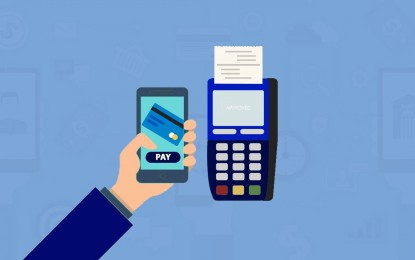
VIRTUAL CREDIT CARD. Union Pay International (UnionPay) Southeast Asia assistant general manager David Chong says Monday (Oct. 17, 2022) a virtual credit card is viable in the Philippines as more Filipinos utilize mobile payments. This supports the central bank's push to have around 50 percent of retail payments in the country account for 50 percent of total transactions by 2023. (PNA graphics)
MANILA – An executive of Union Pay International (UnionPay) Southeast Asia said issuance of the virtual cards among credit card providers is a boost amid digitalization push for financial transactions in the Philippines.
During the virtual 42nd anniversary celebration of the Credit Card Association of the Philippines (CCAP) on Monday, UPI Southeast Asia assistant general manager David Chong said the utilization of mobile payments increases along with smart phone usage penetration in the country.
Chong said credit card issuers thus “can consider issuing virtual cards that allow online purchase and also the contactless payment as well as the QR (quick response) code payment.”
“These will significantly reduce the issuance cost of issuing credit cards, not to mention the much faster speed of deployment,” he said.
He added the number of credit cards issued in the country remains low compared to the total population, a similar picture with Indonesia but a contrast with Singapore.
The Bangko Sentral ng Pilipinas (BSP) aims to increase digital financial transactions to at least half of the total retail payment transactions by end-2023.
During the same event, BSP Deputy Governor Chuchi Fonacier said credit card financial has recovered after getting a hit at the onset of the pandemic, citing the double-digit growth in credit card billings and receivables as of the first half of this year.
Fonacier said credit card billings rose by 41.4 percent year-on-year in June this year, higher than the 29.5 percent during the same period in 2021.
Credit card receivables also increased by 23.7 percent year-on-year during the same period, a reversal from the 2.2 percent contraction a year ago.
“With demand for digital financial products increasing, there is still a lot of scope for growth in the credit card industry,” she said.
Fonacier said the credit card industry has supported the central bank’s program to extend temporary relief measures to consumers during the pandemic through keeping finance charges in line with the BSP’s ceiling, as well as allowed the restricting of credit card receivables.
As of end-July 2022, she said 56.3 percent of restructured consumers loans, amounting to around PHP6 billion, were credit card receivables.
“Moving forward, the BSP will remain steadfast in our commitment of providing an enabling regulatory environment to ensure the continued safety and soundness of the financial system and protection of financial consumers,” she added.
Meanwhile, CCAP chairman Rolando Ebreo dubbed Republic Act (RA) no. 11934, or the SIM card Registration Act, as a “major step in removing the impediments towards digitalization, of pinpointing where the problem really lies.”
“With the SIM registration law, we are set, as a nation, to combat that malice and to once again add a layer of protection for our Filipino consumers. It will help mitigate, if not prevent, scam messages that contain links used to lure the victims into giving out their information,” he said. (PNA)
